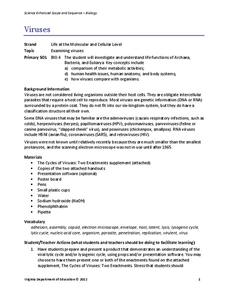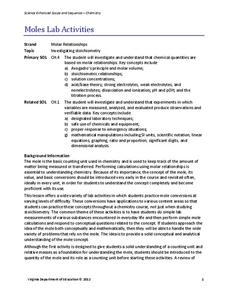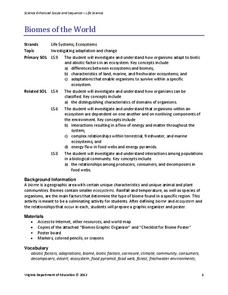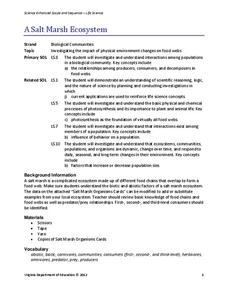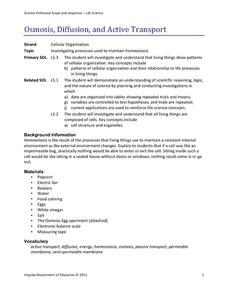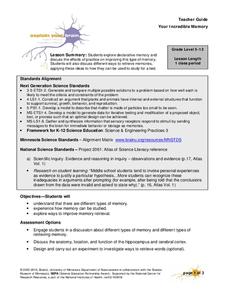Virginia Department of Education
The Effects of Heat and Acid on the Enzyme Catalase
How quickly do enzymatic reactions occur? Assist the class as they examine heat and pH change to determine the rate of chemical reactions using catalase as an enzyme. Watch them "glow" with excitement!
Virginia Department of Education
Viruses
Germs, parasites, and viruses, oh my! Facilitate a instructional activity on viruses as individuals explore functions of Archaea, Bacteria, and Eukarya. They learn how viruses compare with other organisms in nature and how they...
Virginia Department of Education
DNA Extraction from Strawberries
Has your class ever been astounded by the complexity of DNA analysis? Have they ever asked why genetic engineering has become so important to our daily lives? Young scientists perform DNA extraction on strawberries and explore how the...
Curated OER
Moles Lab Activities
General chemistry class members engage in a mini-unit on mole conversions. Through nine lab activites with varying degrees of difficulty, they practice measuring mass and volume, molar calculations, and stoichiometry. Terrific teacher...
Virginia Department of Education
The Cell Cycle and Mitosis
What a packed lesson plan! Provide your class with the opportunity to learn about the cell cycle in several exciting ways. Biologists first learn about the theory behind mitosis, then proceed to view onion tips under the microscope and...
Scholastic
Recovery From Drug Addiction
Are there factors that put some individuals at a higher risk for drug addiction than others? Learn more about the risk factors that may make some people more susceptible to addiction, as well as protective factors that help prevent...
Virginia Department of Education
Biomes of the World
Incorporate knowledge about biomes and ecosystems in multiple ways while encouraging creativity. Emerging ecologists collaborate and perform research to complete a graphic organizer about various biomes of the world. They conclude the...
Virginia Department of Education
A Salt Marsh Ecosystem
What a web we weave. Pupils use yarn as the primary resource to create a web depicting the intricacies of a salt marsh ecosystem. They participate in a question and answer session, which leads to an in-depth facilitated discussion about...
Virginia Department of Education
Osmosis, Diffusion, and Active Transport
No, it really is okay to play with your food! Emerging scientists manipulate popcorn, eggs, and other household objects as they demonstrate multiple cellular processes. The activity, capable of modifications, is designed to reflect the...
Virginia Department of Education
The Cycles of Nature
Encourage peer collaboration and assist with the creation of visual aids to identify carbon, water, and nitrogen cycles as your class learns more about nature. They discuss relative information, create a visual aid depicting the chosen...
Workforce Solutions
A Colony for Lunar Living
Two lessons explore the possibility of living on the moon. First, scholars read various scenarios to identify which careers would best transfer to life in space. Finally, pupils examine a website to locate items made for outer space,...
Curated OER
Ohm's Law: Getting There Hands On
Young scientists inductively derive Ohm's Law of voltage, resistance, and current by creating series and parallel circuits with 9-volt batteries and light bulbs. A week's worth of experiments, observation, and hands-on activities are...
Curated OER
Falling Leaves Poetry Spinners
Why settle for autumn leaves as classroom decorations when you could use autumn poetry? After taking a nature walk and collecting fall artifacts, including seed pods and fallen leaves, learners demonstrate the movement of the season with...
Sea World
Seals, Sea Lions, and Walruses
Learn about the mammals of the sea with a instructional activity about seals, sea lions, and walruses. Kids study the characteristics of each pinniped with flash cards and information, and then analyze data about elephant seals, measure...
Curated OER
More on Conduction and Convection
Why do some items feel colder when they are the same temperature? How should you keep your soda cold? What makes the wind blow? These are just some of the things middle schoolers discover when completing a lesson plan on conduction and...
LABScI
Electrolysis: Splitting Water
Explore the chemical components of water through an electrolysis reaction. Scholars use a battery to divide various water solutions into different gases. As they collect the gases, they measure the volume and make a comparison to the...
University of Minnesota
Your Incredible Memory
Test the efficiency of your memory! Scholars test each other's memory as they explore factors that affect memory retrieval. Through experimental analysis, they discover there are different types of memory, which has an impact on the...
Science 4 Inquiry
The Real Story of Where Babies Come From
Pupils learn about both male and female anatomy before understanding how they work together to make a baby. Scholars discover new vocabulary, create a presentation on fertilization, and discuss related topics.
Nuffield Foundation
How Much Energy Is There in Food?
People associate calories with food, but what is a calorie? Young scientists measure the number of calories in samples of food to better understand the concept. They test a variety of samples, take measurements, and compare their results...
Nuffield Foundation
Intrepreting Information about Sweating and Temperature
Why do we sweat? Scholars analyze data about body temperature, sweating, and other factors to better understand sweating. They note the changes after drinking ice water to sweating, skin temperature, and body temperature. Analysis...
Nuffield Foundation
Assessing Human Hearing
Young scientists explore hearing through multiple experiments, demonstrations, and activities. They focus on the changes in hearing over a lifetime, how we can determine where a sound is coming from, and the ability to filter noises.
National Nanotechnology Infrastructure Network
Gelatin Microfluidics
Micro what? Analyze microfluidics as an application in the medical community. A lab investigation highlights the importance of channel design in biotechnology. Learners modify channels and observe the behavior of the flow of the fluids.
Purdue University
Design of Music Instruments for a Rock Band
Can you create a rock band? Scholars learn about the creation and transmission of sound in a hands-on STEM activity. First, they explore the transmission of sound using a tuning fork. Then, they must solve the problem of missing...
Purdue University
Simple Machines
What's the best way to use a simple machine to solve a real-world problem? Scholars construct their own simple and complex machines to explore the concepts of work and force. They discuss examples of simple machines they have found in...
Other popular searches
- 4th Grade Life Science
- Life Science Inquiry
- Life Science Vertebrates
- Life Science Experiments
- K 2 Life Science
- Life Science on Cells
- Life Science Lesson Plans
- Grade 4 Life Science
- Life Science Report Topic
- Australia Life Science
- The Life Science
- Life Science Lessons



